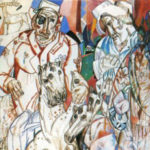We run our website the way we wished the whole internet worked: we provide high quality original content with no ads. We are funded solely by your direct support. Please consider supporting this project.
“Unclean” Animals and the Corruption of Creation
I’ve always been a bit mystified over the distinction between “clean” and “unclean” animals in the OT. I have read several attempts to justify this distinction on the grounds that the former were healthier — or at least less dangerous — to eat, but these defenses never struck me as all that convincing. In his recent book Is God a Moral Monster? (Baker, 2011), Paul Copan offers a much more compelling defense of this distinction (pages 79-84). One aspect of his argument I found particularly interesting was his contention that animals were considered “clean” because they reflect the original order of creation more perfectly than the “unclean” animals and “unclean” because they reflect the effects of the fall more than the “clean” animals.
The connection between the “clean” and “unclean” distinction, on the one hand, and the creation and fall, on the other, is reflected in the book of Leviticus by the repeated phrases “you may eat” and “you shall not eat” (Lev. 11:3, 9, 11, 21, 22) which, Copan argues, echo the provision and prohibition to Adam and Eve in the garden (Gen. 2:16; 3:2). This connection arguably explains why predators and animals that had been preyed on were prohibited (Ex 22:31; Lev. 17:14) for, according to the Genesis narrative, the original creation was non-carnivorous (Gen. 1:31). Even when humans were permitted to eat meat after the flood they had to first drain the blood out, for the blood was (and is?) considered sacred (Gen. 9:4). Hence, animals that prey on others and consume their blood are, to this degree, out of sync with God’s creational design.
What I find most significant is that this explanation of the “clean” and “unclean” distinction presupposes that nature has been significantly affected by the fall, as the Genesis narrative itself suggests (Gen. 3: 14-19) and other passages of Scripture confirm (e.g. Rom. 8: 19-22). The very fact that Satan is said to hold the power of death (Heb 2:14) reveals how thoroughly creation has been corrupted, for it means that, at least as we now experience it, there is nothing “natural” about death. So too, the fact that the New Testament consistently depicts physical infirmities as directly or indirectly due to Satan and demonic influences makes this point as well.
As I argued on this blog several years ago (it was actually several blog posts sprinkled throughout 2007 beginning here), the view that nature itself has been corrupted by fallen spirit agents has enormous apologetic value, for it means there is no such thing as “natural evil.” While we should avoid the nonsense of claiming there’s a specific demonic force behind every physical infirmity or every “natural” disaster, we can and should nevertheless claim that, were it not for the corrupting influence of Satan and demonic powers in nature, there wouldn’t be any physical infirmities or “natural” disasters. For the same reason, it also means we don’t have to accept that infirmities and disasters are “acts of God.” And, as I argued in an essay entitled “Evolution as Cosmic Conflict” (included in T. Oord, ed., Creation Made Free, Pickwick, 2008), this perspective also helps explain why the evolutionary process leading up to humans was so remarkably violent. (I address the apparent conflict between this perspective and Gen. 1:30 in my essay).
So, the next time you see a “natural” disaster, experience a physical infirmity, encounter a death, witness an animal ripping another apart or (if you must), bite into one yourself, remember that the creation wasn’t originally meant to be this way, and one day it will be so no longer (Isa 11:6-9).
Peace
Greg
Category: General
Tags: Animals, Problem of Evil
Related Reading

The Magi and an Arbitrary Massacre
On a cool fall night in Bethlehem, late in the 34th year of the reign of king Herod, a peasant family of five sleeps quietly in a one room shanty at the edge of town. They are startled awake as two Roman guards burst through their door shouting something about an edict from a king.…

The Warfare Worldview: What Would You Tell the Younger You?
Aftab Uzzaman via Compfight Jessica Kelley has been fleshing out the Warfare Worldview on her blog in a series of posts using the lens of the death of her child, Henry. Jessica is a beautiful writer, and her reflections are powerful and tender. You’re going to want to be listening to her. Her voice is an…

Life and Death in Haiti
Sometimes it’s important to hear about other lives, much sadder and difficult than our own, to reorient us to what is most important. In this season of elections that can be so divisive and in an economy that seems so fragile and creates hardship for many of us, it’s important to remember that we are…

God Does Not Always Get What He Wants
One of the ways the Bible makes it clear that humans have free will and that God doesn’t predetermine human decisions is found in the responses God has toward human choices. Scripture consistently depicts God as being frustrated by the way his people obstinately resist his plans and Scripture often depicts God’s heart as breaking…

Did God Cause the Polar Vortex?
When is this polar vortex thing going to end? It’s March, and even in Minnesota we expect to see temperatures warmer than this. With all of the sleet and cold in the south, it seems like schools are closing more than they are open. While this is not a catastrophic event like a hurricane, tsunami,…

Why We Can’t Know Why
Various fields of science have taught us that the slightest variation in a sufficiently complex process at one point may cause remarkable variations in that process at another point. The flap of a butterfly wing in one part of the globe can be, under the right conditions, the decisive variable that brings about a hurricane…
